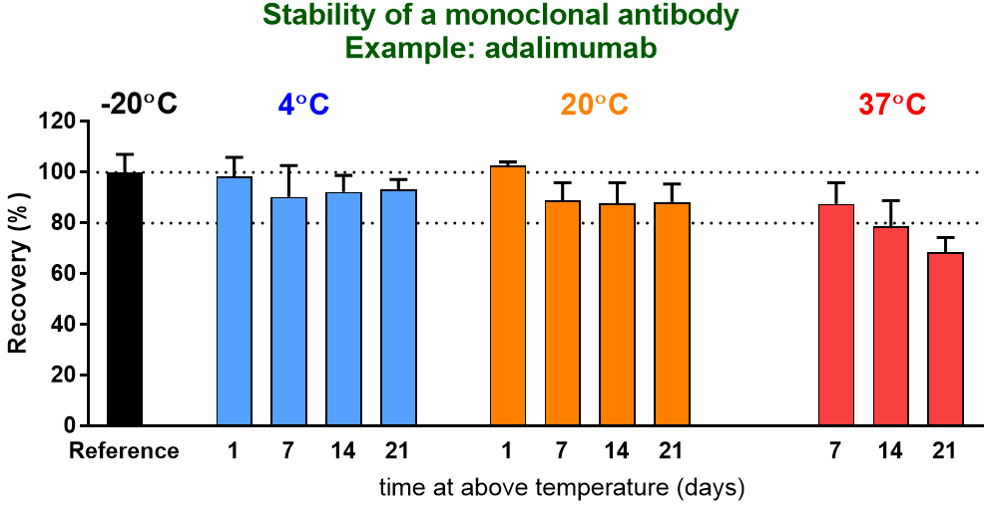
Cold shipments
Accurate measurement of biologics PharmacoKinetics and Anti Drug Antibodies with cold shipmentShipping Guidelines for Biological Samples
To optimize shipment costs, we recommend shipping your samples cold rather than using dry ice. Our studies have demonstrated that maintaining samples at cold temperatures ensures the accurate measurement of serum concentrations of biologics (e.g., adalimumab, infliximab) and their anti-drug antibodies (ADA) (Figure 1).
For shipments with a duration of less than 24 hours, we advise using refrigerated or frozen samples with an ice pack to protect against temperature fluctuations during transit. For shipments exceeding 24 hours, we recommend using dry ice to ensure samples remain stable and protected from temperature peaks.
Please note that samples are not unpacked during weekends and national holidays, which should be considered when planning your shipments.

Figure 1. Keeping serum samples spiked with 5 µg/mL of adalimumab at 4°C and 20°C (as depicted by blue and orange bars) does not affect recovery as compared to a frozen reference sample (black bar): recovery is no less than 80%. Storing at 37°C (in red bars) reduces the recovery to less than 80%. The bars depict an average of 3 to 6 independent measurements of serum samples spiked with adalimumab and kept at a specific temperature for 1, 7, 14 or 21 days.
Shipping Instructions for Eculizumab and Antibody Fusion Biologics (Abatacept and Etanercept)
For the biologics Eculizumab, Etanercept, and Abatacept, samples must be shipped frozen on dry ice.
- Eculizumab: To accurately reflect the in vivo equilibrium between Eculizumab and its target C5, and to prevent further complement activation, samples for Eculizumab testing should be frozen immediately after clotting and stored at -20˚C.
- Etanercept: This biologic deteriorates after prolonged exposure to non-frozen conditions (Figure 2). Therefore, it is crucial to maintain frozen conditions during shipment.
-
Abatacept: Given its structural similarity to Etanercept, the same shipping conditions are recommended.

Figure 2. Keeping serum samples spiked with 3 µg/mL of etanercept at 4°C, 20°C and 37°C (as depicted by blue, orange and red bars) affects recovery as compared to a frozen reference sample (black bar): recovery is less than 80%. The bars depict an average of 3-6 independent measurements of serum samples spiked with etanercept and kept at a specific temperature for 1, 7, 14 or 21 days.

